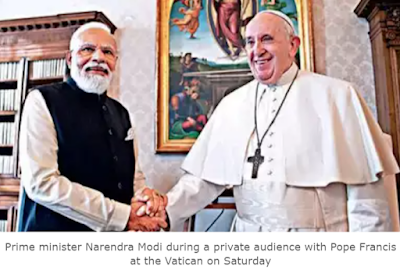Some Political Games
Politics is a game like chess. The pawns are
sacrificed first. The King remains in the end on the board. The whole game is
meant for keeping the king there till the end. Everybody else is dispensable. That’s
what the system makes us believe. We all keep playing the game because we have
no other choice if we wish to survive at all. That’s how the system is made to
be.
The book I’m reading now is Farooq of Kashmir by Ashwini Bhatnagar and R C Ganjoo. There’s a lot of amusing info on the Abdullah family of Kashmir in this book. You know those facts perhaps. But there’s no harm in being reminded once again and to draw some parallels with our present ruler. I mean, it doesn’t matter whether you are an Abdullah or a Modi as long as you are a politician. The behavioural pattern is the same.
Politics is a religion by itself. The
ordinary people are the foolish devotees and the rulers are the gods. The
angels are the crony capitalists who provide the funds, stolen from the
ordinary folk through many devious ways such as nonrefundable bank loans.
I’m still reading Farooq of
Kashmir. Just wanted to share with you something that made me stop
reading and start thinking. Start writing, rather.
Farooq Abdullah, his father Sheikh
Abdullah, and his son Omar Abdullah have ruled Jammu & Kashmir for a long
time. Just as Modi and Parivar will be doing in India for many more years. History
is useless unless we get the parallel lessons right.
Sheikh
Abdullah’s great-grandfather was a Hindu Brahmin who converted to Islam after meeting
a Sufi preacher. His wife
was the daughter of Michael Harry Nedou, a European Christian who had
converted to Islam for marrying a Muslim girl he loved.
Where do we draw the line between
religions? There was so much miscegenation in this country that there is sure
to be some Muslim blood in every Hindu and vice versa. Buddhist blood too.
Christian too. And perhaps some others too. Do you have the guts to go back
really into history instead of playing with delusional myths?
How far will you go into the past
re-creating history to cleanse your blood racially? One simple DNA test is
enough to burst your myths that you call history.
But what really bothers me is not the
DNA. It’s the politics of convenience. What provoked me to write this is the
compromise that Yogi Dhirendra Brahmachari (DB) made with Farooq Abdulla for
the sake of politics. DB was Indira Gandhi’s guru. Though he was a yogi, a
humble and austere ascetic, he had more wealth than today’s Ambani or Adani.
Political connections make you rich even if you don’t want to become rich. The
simple, humble, austere yogi was catapulted to a Peacock Throne by politicians.
Eventually he was the owner of a whole empire that included sprawling ashrams, the
Shiva Gun Factory in Kashmir, two aircrafts which were always busy carrying
politicians around, and a pure white length of linen that covered the nakedness of
the humble, simple, ascetic yogi DB.
Farooq Abdullah must have gauged
Dhirendra Brahmachari at first sight. Love at first sight, let’s say. Farooq
demanded a night of pleasure at the yogi’s splendorous ashram. Farooq had a
great time with a beautiful girl and many handsome boys at the ashram. Politics.
With a little religion as spice.
That’s how it is. Politics and
religion. An understanding among people who matter. An understanding that makes
enemies of people in the streets while the leaders will have all the fun in resorts.
These people who matter also know how
to keep the ordinary people out of the whole game. The pawns. They are to be
sacrificed. They will play the game on the streets. They will die. The real
game is won in splendid palaces by people wearing costumes of convenient hues.
Let’s come back to the present from Indira Gandhi and her Brahmachari. Just to know that nothing has changed in India. Except, may be, the way it’s all publicised.
Oct 2021. India’s Prime Minister,
Yogi, Priest, Vishwa Guru and many other things rolled into one, come on, give
him a big hand, none other than His Highness (HH) Narendraji Modiji himself, visited
the Pope in the Vatican. At that time, the Christian
churches in Uttar Pradesh, a state governed by a yogi no lesser than Modiji, were
being pulled down by Modiji’s partymen.
Eventually HH Narendraji Modiji met
many other Christian leaders in many places including a star hotel in Kochi
recently and they had splendid dinner parties. Ordinary fellows still fight on the
streets in the name of these religions which actually bring their leaders
together at splendid resorts.
Let me return to the Farooq book. I shall be here with more interesting stuff tomorrow. Trust me, I may be better entertainment than these leaders who are enjoying themselves in fabulous places at our cost.
 |
| Sacred Heart Cathedral, Delhi |
 |
| The latest costume, at Kashi Vishwanath temple |
X


Do not go too far into your family history if you want to believe in some sort of "purity". That's a myth, anyway. Sad that people are going back to wanting this sort of thing.
ReplyDeleteIndia is being taken so far back into the past that we're losing track of the difference between history and myth.
DeleteIndian politics is not for beginners 💀
ReplyDeleteSo true!
Delete